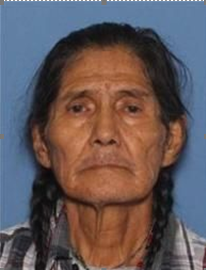By Wil Phinney of the CUJ
MISSION – More than two dozen members of Toby Patrick’s family gathered April 18 to honor the foods that his elders promised would protect them.
Now he could face up to a year in jail or a maximum fine of $5,000 for violating a COVID-19 social gathering directive issued in March by the Board of Trustees for the Confederated Tribes of the Umatilla Indian Reservation (CTUIR).
“I understand the coronavirus, but there are still things and laws we have to live by, too, as Indian people,” Patrick said in a phone interview May 5.
The CTUIR Incident Command Team initiated an investigation in late April after a photo of the gathering was posted on Facebook. Patrick said he was interviewed by an officer from the Umatilla Tribal Police. According to Incident Commander Chuck Sams, a police report was submitted to the Tribal Prosecutor to determine disposition of the Patrick gathering.
Tribal Police Chief Tim Addleman said the CUJ’s questions were related to potential prosecution and would need to be answered by Prosecutor Kyle Daley, who did not respond to e-mail sent May 5, nor to phone calls made May 6 – the day the CUJ went to press.
The Patrick incident is not the only “unsanctioned gathering” that’s been investigated by Umatilla Tribal Police, according to a report presented by Sams to the CTUIR Board of Trustees on the morning of May 6. Sams noted an “uptick” in such activity since mid-April by CTUIR members as well as Indians from other tribes. Patrick said he made it clear to the Tribal Police investigator from the start that they were coming at the issue from opposite poles.
“Before we started in on anything I wanted to make sure he knew his belief was not my belief and mine ain’t his,” Patrick said. “I wanted to get that straight. The way he believes and the way I believe are two different things.”
Patrick said he knew on the morning of the feast, when more people arrived than he expected, that there probably would be repercussions.
“I mentioned it at that morning service,” he said. “I told them what we’re doing, we’re going to get in trouble because a lot of people ain’t going to understand. They’re not going to know the feeling we’re holding on to here right now.”
That feeling, Patrick said, is about believing what he was taught by his elders, back when he was an 8-year-old sharing a sweat with his grandfather and uncles. He remembered a lesson they taught him about the importance of traditional foods and the sweat. A teacher in his sophomore year of high school told him he could make up his grade if he wrote a paper about the depression. He was to ask his elders what it was like to live in those desperate years.
Instead of an answer for his paper he received a stern rebuke during a sweat as his uncles kept pouring the water on the hot rocks, making the environment nearly unbearable.
Once he told his elders he was asking the question for a school paper they relaxed, but they admonished him for not know the answer himself.
“We had the food, we hunted, we had the roots, the berries, we knew how to preserve, how to take care of the foods from year to year,” Patrick said. “That’s what my elders taught me, that’s the feeling from my elders and that’s why I stand on the foods.”
But, he acknowledged, “I know the rules and if I did wrong and I get charged then I guess I let that fall into place too … if they feel that strongly about a family gathering and hate what I did.”
As an Indian, Patrick said he should be able to remember what his elders told him and live by their words.
“I believe what I’ve been taught and that faith will take care of me and my family. I believe that if I follow what I’m following we’ll be okay. I can only hope and pray that I’ll be okay, and for all those people who were offended and hurt by our gathering, I’m praying for you folks, too.”



